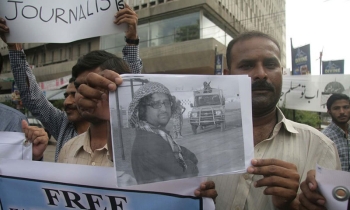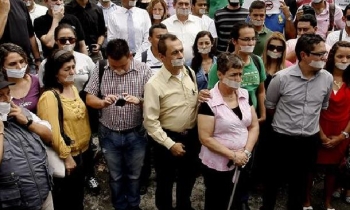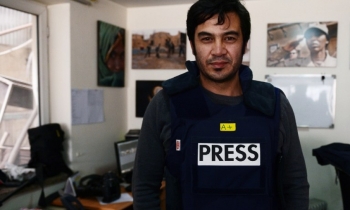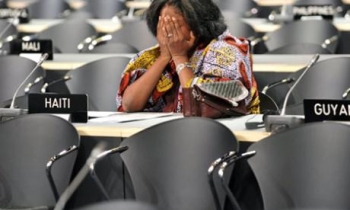The 30 or so people who will take their desks next January in Sheridan College's new Canadian Journalism for Internationally Trained Writers program don't fit the college-student image. Many will be middle-aged, with worry lines. Some will have done prison time. All will speak with accents and carry themselves, well, as the seasoned journalists they were in previous lives -- influential, controversial, feared -- and all want to find out how to add their voices to news-making in Canada.
Last week, Sheridan started the admittance process for the program, offering a place to students such as Luis Alberto Mata, 42, a human-rights writer and professor in Colombia. After unpleasant strangers turned up at his mother-in law's house asking his whereabouts, and men in a taxi made a grab for his son, the Mata family fled to Toronto.
Here, Mr. Mata works part-time cleaning in a Don Mills organic food store. "But of course, of course, I would like to become a journalist again," he says.
Another Sheridan student will be Nikahang Kowsar, 36, once one of Iran's leading political cartoonists. He wasn't intimidated by a stint in Tehran's Evin Prison. But after local imams declared that his drawings insulted Islam, he moved to Toronto. Although Mr. Kowsar's work has appeared in The New York Times and Maclean's, "it's awful trying to get cartoon work here," he says. "I must learn more about being a journalist."
Back in Ethiopia, says Desaleyn Eyob, 35, "I had my own news agency, I was getting good money, I had my own office, my own car, a comfortable life. But government and religious groups were harassing me. Life was not fun." He left in 2000, and now scrapes by in Toronto doing wedding videos. A correspondent for Reuters, he wants to practise journalism here, "but I have no clue what Canadian editors want," Mr. Eyob says. He volunteers on community television but admits "it's very hard to sell a story that connects Canada to Ethiopia."
About 300 people arrive in Canada each year with dreams of pursuing a journalism career; half head for Toronto or Mississauga. But until the launch of the three-semester Sheridan program (unique in Canada, and possibly North America), little has helped these people integrate into the North American media.
When Joyce Wayne, head of journalism at Sheridan, held an information session on the new program last month, more than 50 people turned up. "That night, we could see in a visceral way how desperate people are for this," Ms. Wayne says. "They were at the centre of their worlds; now, they're delivering pizza."
She quotes exiled author and essayist Reza Baraheni on his sense of exclusion: "I was in prison in Iran, then I was in prison in Canada."
Yet while Canadians are ashamed of our economy's failure to absorb foreign-trained doctors or engineers, few lament our inability to harness the skills of foreign journalists. We overlook these people at our peril, says Jim Poling, adviser to the Sheridan program and managing editor of The Hamilton Spectator, one of the few newspapers in North America with a program to run stories by exiled journalists.
It started back in 2001, when a critically ill woman arrived from the Congo and was taken straight to Hamilton's Henderson General Hospital. As local media scrambled to cover the story -- did she have Ebola? -- Mr. Poling realized that a significant story was affecting the city and he didn't even know it had a Congolese community. "So I thought: 'What can we do to better reflect this city?' I'd heard of immigrant doctors driving cabs. It hit me that there were journalists too."
So the Spectator threw a small party for local immigrants with media backgrounds. Throngs turned up, journalists with hometowns from Azerbaijan to Zimbabwe and harrowing accounts of press repression. "I thought: 'My God, these people passionately believe in journalism. Why can't we find them work?' " Mr. Poling says. Choosing 10 people who were proficient writers in English, he organized discussions on what stories his newspaper needed.
Then the fun began. Some newcomers, who had honed their skill churning out propaganda, had exotic standards of "objectivity." Some exiles wanted to write treatises on human rights back home while their Canadian editors wanted stories on multiculturalism in Ontario. Some editors didn't understand the newcomers' experiences. Still, more and more of their bylined stories began enriching the Spectator's pages.
When he was approached by a Chilean woman who said she wanted to write about Sept. 11, Mr. Poling said, "New York?" She replied, "No, the Chilean Sept. 11." Mr. Poling suddenly realized that Hamilton had a community 5,000 strong for whom that date meant the overthrow in 1970 of Salvador Allende's government. "This is what cultural diversity means," he says.
Sheridan's Joyce Wayne doesn't underestimate the cultural divide between foreign-trained journalists and Canadian media. To help bridge it, her program offers courses in how to sell a story to a Canadian editor; Canadian literature and culture; and media law and ethics. "It's not that these people are not trained, it's that their tone and register seem wrong for Canada," she says. "Yet here in Toronto, we may have more exilic writers than anywhere else. Can't we define a new sense of what Canada is?"
Here's another question: Will Canadian media run the stories these veteran warriors for press freedom want to tell? "I want to approach the same stories in Canada as I did in Colombia," Luis Mata says. "Your native peoples, your kinds of poverty, whether multiculturalism is a myth."
Both he and Desaleyn Eyob sense that there may be a gap between their ambitions and the realities of Canadian journalism. "Are the Canadian media free and fair," Mr. Eyob asks, "or do they just want to entertain us?"
And these journalists will be able to answer such questions only if, after Sheridan, they can find a job.
The outsiders
Frustrated by their efforts to get their stories into mainstream Canadian media, Journalists in Exile -- a
Toronto-based group of more than 70 immigrants -- has launched its own on-line magazine (http://www.jexcanada.com). The current issue features essays written by its members, such as Poverty and its Alleviation by
Mohsin Abbas, a journalist from Pakistan, and Economic Censorship of Media in Eastern Europe by Genc
Tirana, a leading Albanian journalist and media professor now living in
Toronto.
"We decided to start this project not only to find a voice on different
issues, but also to bring Canadian media attention to our group and our perspectives," says Maryam
Aghvami, president of Journalists in Exile.
A former Reuters reporter in
Tehran, she now lives in Toronto and works as a producer-reporter for Voice of America. She says her group hopes that Canadian news media will consult the site to find interpreters, translators and story ideas.
The website candidly acknowledges that it also exists as "a plea to media organizations to find new ways of working together with one of the most diverse groups of journalists in order to grant them an opportunity to contribute."









